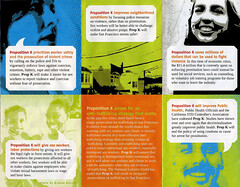 |
|
| See how pro-Proposition K activists are spinning the issue in campaign fliers. |
Proposition K, which seeks to decriminalize prostitution in San Francisco, has spawned a heated debate over how to curb human trafficking and protect the lives and health of sex workers.
A close look at campaign advertising around the proposition reveals sharp disagreements between supporters and opponents over what the local impacts of the law would be, as well as a schism in feminist circles over prostitution itself.
Drafted by the Erotic Service Providers Union (ESPU), a local sex workers’ alliance, Proposition K would require San Francisco law enforcement to disregard state laws prohibiting prostitution.
The measure also calls for the estimated $1.6 million to $3.2 million currently spent on prostitution-related arrests and prosecutions to be directed toward other crimes, including violence against prostitutes.
Despite an impact that would be purely local, the dialogue surrounding the proposition reflects the increasing globalization of the sex industry.
"Mythology" For Both Sides
Proponents argue that decriminalization will help eliminate coercion and violence against sex workers — including those who are trafficked — because prostitutes will be able to report abuses to the police without fearing arrest.
Supporters also say that decriminalized prostitution would empower clients to approach authorities if they suspected a prostitute had been trafficked or was being victimized by a pimp.
Opponents, however, argue that decriminalizing prostitution will make it harder for law enforcement to pursue human trafficking cases because they will have fewer legal tools at their disposal.
Both sides are basing their arguments on untested theories, as there are currently no known models of officially sanctioned decriminalized prostitution.
Countries and cities such as New Zealand or Amsterdam that have sought alternatives to criminalization have instead legalized prostitution, which then allows for government regulation (which some proponents of decriminalization are wary of).
"Mythology is informing both sides of the debate," says Ron Weitzer, a professor of sociology at George Washington University and an expert on prostitution policy. "From the opponents, there is talk about the dramatic increase of pimping and more abuse of women and more young girls who would be put into prostitution if this proposition were to pass, but they don’t have the evidence to support that argument because there is no model for it to be compared to.
"The mythology on the yes-on-Prop K-side is that a totally unregulated system is the best option for workers, and there’s plenty of evidence internationally that that’s not true," Weitzer adds. "Decriminalization means that workers don’t have any kinds of protections in place that are institutionalized. Instead, everything falls on the workers themselves to report abuses and solve problems."
Fact-Checking the Supporters
Backers contend that the current legal framework isn’t effective in combating trafficking.
On a Web site and flyers paid for by the Committee United for Safety and Protection, proponents state that "as of this date, there have been no prosecutions for human trafficking in California."
According to a University of California at Berkeley study, however, there were 57 human trafficking cases involving more than 500 victims in California between 1983 and 2003; about 46 percent of those victims were involved in sex trafficking.
Supporters of Proposition K also argue that decriminalized sex work leads to healthier, safer communities.
In making these claims, proponents tend to use the terms "decriminalization" and "legalization" interchangeably, even though they are not comparable.
For example, flyers produced by supporters of Proposition K state that "studies have shown over and over again that decriminalization greatly improves public health."
In fact, some studies have shown that prostitutes are healthier and feel safer under legalized prostitution regimes, where the workplace and testing for sexually transmitted diseases is regulated by the government.
The proponents’ Web site also says that "a five year study just released in New Zealand, where decriminalization has been in place since 2003, found no increase in prostitution, either street or home based."
The New Zealand study, however, was based on results of the country’s legalized prostitution industry, and cannot be compared with the potential ramifications of decriminalization, which are unknown.
Fact-Checking the Opponents
Opponents say that decriminalization would negatively impact local efforts to prevent human trafficking by arguing that California’s prostitution laws are routinely used to "investigate and prosecute traffickers and those involved in exploiting children."
Indeed, local and federal law enforcement have relied on prostitution laws to conduct raids on Bay Area brothels to pursue trafficking cases, as was the case in a 2005 federal investigation of Bay Area Korean massage parlors.
Because human trafficking occurs in all industries, state and federal labor laws are also frequently used to prosecute traffickers, and these laws could be used to pursue sex trafficking cases if prostitution is decriminalized.
Furthermore, the federal Trafficking Victims’ Protection Act and the state’s anti-trafficking law could trigger prosecutions of traffickers.
Whether it will be harder or easier to pursue sex trafficking cases as a result of decriminalizing prostitution remains to be seen.
Reflecting an anti-prostitution perspective, opponents also paint a grim portrait by making a number of dramatic statistical claims about the sex industry that are not entirely accurate.
For example, a Web site paid for by the Committee Against Trafficking and Sexual Exploitation notes that the average age of entry into prostitution is 12 to 14 years, and 90 percent of those in prostitution want to escape it.
Those figures were gathered by local social service organizations, and while the numbers may accurately reflect the circumstances of the agency’s clientele, the data does not distinguish between street prostitution and indoor prostitution.
Also, because the data is not based on a randomized sample, it cannot be generalized to the entire prostitution population in San Francisco.
Differing views among feminists
The debate among those for and against Proposition K also highlights a differing philosophy about prostitution among feminists.
Proponents argue that sex work is in essence a form of female empowerment because it reflects a woman’s ability to make choices about her body.
As a result, their Web sites and leaflets frame the measure as a matter of justice and civil rights that would create "equal protection" for sex workers.
The largest donors to the Committee United for Safety and Protection are ESPU founder Maxine Doogan, Spread magazine, and Jeffrey Klausner, director of STD Prevention and Control Services at the San Francisco Department of Health.
Opponents of Proposition K believe sex work is predicated on the objectification of women and that prostitution is inherently unhealthy, sexist and exploitative.
On their Web site, they argue that Proposition K is "dangerous" and will "harm women, children, and the San Francisco community as a whole."
The largest donors to the Committee Against Trafficking and Sexual Exploitation are Twiss Butler, a lifelong member of the National Organization for Women; an organization called the Coalition Against Trafficking in Women; and Gloria Steinem.
Effects on city funding, spending
In addition to focusing on decriminalization, Proposition K contains two clauses that could affect the way the city receives and administers funds related to human trafficking and prostitution.
First, Proposition K would forbid the city from applying for or receiving state or federal funds to prevent human trafficking if the money is spent on efforts related to "racial profiling" of sex workers.
It is unclear whether this clause will impact the city’s ability to receive funds related to trafficking; human-rights advocates note that traffickers often prey on specific immigrant communities, making investigations and outreach into certain racial or ethnic groups necessary.
Secondly, Proposition K would require the city to stop administering what supporters of decriminalization have dubbed "re-education" programs.
One program specifically identified in the initiative for termination is the First Offender Prostitution Program (FOPP), a diversion program for clients who pay $1,000 to participate, and from which the city collects about $162,000 a year.
About half of the funds derived from the FOPP are used to support programs that provide social services to prostitutes who express interest in leaving the profession.
The San Francisco 2008 Election Truthiness Report is co-produced by Newsdesk.org and The Public Press, and funded through small donations using the Spot.Us "crowdfunding" Web site. Tune in Crosscurrents on 91.7 KALW-FM in San Francisco, Thursday, Oct. 30 at 5:00 p.m., for more on Proposition K with reporter Bernice Yeung.







